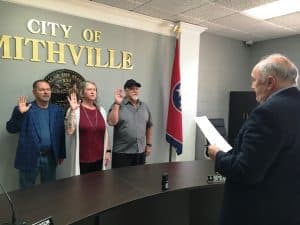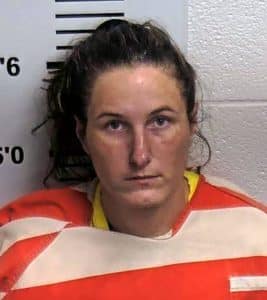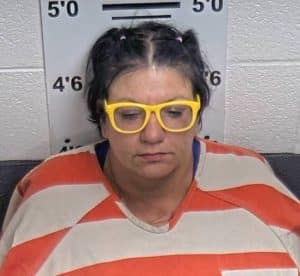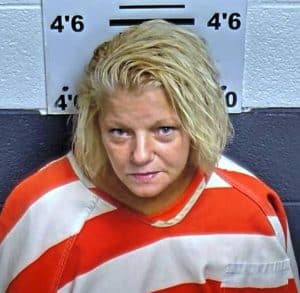News
Barrett Faces Three Year Sentence in Aggravated Burglary Case
August 21, 2024
By: Dwayne Page
A man who allegedly broke into a residence and stole a chainsaw in March made an appearance in DeKalb County Criminal Court today (Wednesday).
24-year-old Kristofer Ryan Barrett entered a plea to one count of aggravated burglary and is facing a three-year sentence. A hearing on sentencing will be held at a later date. He has requested judicial diversion. Barrett must pay restitution of $1,100 at $200 per month to the victim. He was given 46 days jail credit.
Sheriff Patrick Ray said that on March 22, Barrett allegedly broke into a residence on Crestview Drive by forcing open the front door and stole a Stihl chainsaw valued at $1,000.
In other cases, 30-year-old Alex Murphy entered a plea to driving under the influence and received a sentence of 11 months and 29 days suspended to supervised probation except for 48 hours to serve. He was fined $350 and will lose his driver license for one year.
Smithville Police Chief Mark Collins said police were dispatched to Wal-Mart on March 13, 2023 after a man was reported to be passed out in his vehicle. Upon arrival, an officer found the man, Murphy slumped over in the driver’s seat holding a handful of white pills, identified as Xanax. There were two children in the vehicle with him. One of the kids had no shirt or shoes and was in the front seat shivering. The other child was in the backseat half buckled in a car seat that was not connected to the vehicle. The engine was turned off and the doors were locked.
40-year-old Matthew Randall Sullivan entered a plea by criminal information to possession with intent to sell or deliver heroin. He received an eight-year sentence to serve but he will be furloughed to out of state long term treatment. If treatment is completed the balance of the sentence will be on probation. If treatment is unsuccessful, Sullivan is to report to jail to serve the sentence. He was fined $2,000.
Sheriff Ray said that on July 21 a deputy was patrolling Sparta Highway when he spotted a blue Jeep with the driver’s side taillight out. He conducted a traffic stop and spoke with the driver/ owner of the vehicle, 41-year-old Jonathan Kyle McCormick and a passenger, Sullivan. The officer searched the vehicle and found two baggies that contained a crystal-like substance believed to be methamphetamine. One of the bags weighed 451 grams and the other weighed 225 grams with a combined weight of 676 grams. Also found were several baggies and a scale in addition to the following: a baggie that contained a white powdery substance believed to be heroin that weighed 32.01 grams; a baggie that contained a white powdery substance believed to be cocaine that weighed 4.51 grams; a baggie that contained 10 yellow pills believed to be Xanax; a straw with residue; a scale with residue; a glass with a red liquid inside; a pill bottle that contained two orange pills believed to be Buprenorphine; and several burnt pieces of aluminum foil.
The case against McCormick apparently remains pending in court.
Smithville Mayor and Aldermen Discuss Amending City Beer Ordinance
August 21, 2024
By: Dwayne Page
Should the Smithville Mayor and Aldermen update the city’s beer ordinance to make it easier for businesses including eateries in the downtown business district to sell the beverage?
During a workshop Tuesday evening, the Mayor and Aldermen met to discuss the issue and the first step toward a final decision is expected when the board meets in regular monthly session next month.
Under the existing ordinance, the language states that “In no event will a permit be issued authorizing the manufacture or storage of beer, or the sale of beer within 400 feet of any school or church. The distance requirement shall be measured in a straight line from the primary entrance of the establishment seeking a permit to sell beer to the primary entrance of the school or church”.
Some business owners downtown who are seeking a change say the existing beer ordinance is an impediment to economic growth and its unfair in that some businesses can qualify for a beer permit while others cannot because of the 400-foot distance requirement. They want this restriction removed from the ordinance.
Mayor Josh Miller said putting the question on the ballot for a referendum is not an option.
“We questioned if we could put it on a referendum but that was shot down by the state. Administrator of Elections Dustin Estes checked that out and found that it had to be approved or not approved by the council,” said Mayor Miller.
The mayor further explained that if this ordinance is amended concerning the distance requirement it would only pertain to the C-2 zone which is the downtown business district and none of the other existing regulations in the ordinance would be changed.
“We are not talking about changing this for the whole town and nothing is changing on any ordinance other than that 400-foot requirement” he said.
“With the way downtown has been booming and growing in the past few years and continues to do so why would we not entertain the idea” asked Alderman Jessica Higgins. “I understand there will be people against it and I am happy to hear from them who come to speak but anytime on Sunday after church you find many people at places like Applebee’s, O’ Charleys’, Cheddars, and Twisted Oaks” (where they serve alcohol). The idea that people are going to get drunk and pour out into the streets hasn’t happened with the businesses already serving it downtown. I think what is important to focus on is that our downtown is growing and thriving, and it can go to another level,” said Alderman Higgins.
“I have never been in a restaurant that sold alcohol and seen anybody in there drunk,” said Alderman Danny Washer. “You don’t go in there to get drunk. You go in there to eat a meal and if you want to have an alcoholic beverage with it that’s fine. A lot of people that have talked to me about it like the idea and there are not that many places in town where you can have anything like that but people want a choice,” he said.
“What I am really frustrated about is that we can’t make it a city issue (referendum) and let the people vote on this because it affects more than five people (aldermen),” said Alderman Beth Chandler. “It bugs me that only five people make this decision because I care about everybody, and I have had a lot of feedback from this. I have had people venomously on both sides reach out to me. I just want everyone to know that whichever way I vote I do care about this city, and I hate to make 50% of them mad no matter what I do,” she said.
There are four churches within the C-2 zone downtown business district that could potentially be affected by a change in the city beer law regarding the distance requirement including the Smithville First Baptist Church, the Smithville First United Methodist Church, the Smithville Cumberland Presbyterian Church, and the Refuge Church.
The mayor and aldermen will consider the issue again during the next regular monthly meeting on Monday, September 9 at 6 p.m. at city hall. A public hearing would be held at a later meeting should the ordinance amendment be approved on first reading.
Prior to the workshop, Smithville Aldermen-Elect Shawn Jacobs, Danny Washer, and Jessica Higgins each took the oath of office in a brief ceremony Tuesday evening at city hall. The oath was administered by City Attorney Vester Parsley. All three were re-elected without opposition in the Municipal Election August 1. Their new four-year terms will begin officially on September 1.
Smithville Police Arrest Sparta Woman After Finding Her Intoxicated with a Weapon and Meth
August 20, 2024
By: Dwayne Page
Smithville Police recently arrested a Sparta woman after finding her intoxicated with a weapon and methamphetamine.
32-year-old Hope Leigh Hicks is charged with driving under the influence, possession of a handgun while under the influence, violation of bond conditions, and possession of methamphetamine with intent to manufacture, sell, or deliver. Her bond is $21,500.
Chief Mark Collins said that on July 31 police were summoned to South College Street where a woman was reported to be slumped over the wheel of a vehicle with the motor running. Upon arrival the officer awoke the woman, Hicks and got her out of the vehicle. She was unsteady on her feet. Hicks’ speech was slurred, and her eyes were red and watery. She consented to but performed poorly on field sobriety tasks. A small bag of a crystal-like substance was found in the vehicle along with a loaded nine-millimeter handgun. Police learned that Hicks was under bond conditions from an aggravated assault case preventing her from having possession of a firearm. She was placed in custody and a blood sample was taken from her.
30-year-old Alexis Nandez of Smithville is charged with a second offense of driving under the influence, simple possession of a schedule VI drug, possession of drug paraphernalia, evading arrest, resisting arrest, and he was cited for driving on a revoked license, financial responsibility, and driving on roadways laned for traffic.
Chief Collins said that on August 4 police tried to pull over a vehicle on East Broad Street for failure to maintain its lane of travel, but the driver refused to stop. The automobile continued on East Broad then turned onto Smith Road and into a driveway before driving through a yard and coming to a stop. Several times, officers ordered the driver, Nandez to get out of the vehicle but he refused. They had to physically remove him from the automobile. Nandez smelled of alcohol and his speech was slurred. Nandez admitted to having consumed alcohol earlier. During a search of the vehicle, police found a pipe along with a green leafy substance believed to be marijuana. His bond was set at $18,500 and he will be in court August 22.
37-year-old William Dillon Weaver of Woodbury is charged with driving under the influence, and he was cited for violation of a traffic control device.
Chief Collins said that on August 4 an officer pulled over a vehicle for failing to stop for the red light at the intersection of Broad Street and Congress Boulevard. Upon arrival, the officer spoke with the driver, Weaver who smelled of alcohol. His speech was slurred and his eyes watery. Weaver said he had just left Turtle’s Bar where he had consumed several beers. Weaver submitted to but performed poorly on all field sobriety tasks. Weaver was then placed in custody and a search warrant was obtained for a sample of his blood. Bond was set at $2,500 and his court date is August 22.
45-year-old Melinda Myers of Smithville is charged with public intoxication. Chief Collins said that on August 6 police were dispatched to Fall Creek Drive where a woman was reported to be engaging in threatening behavior toward her neighbors. Upon arrival, officers found Myers in the road yelling and cussing at others. Myers continued acting in an aggressive and irate manor even as officers tried to speak with her and she smelled of alcohol. Her bond is $1,500 and she will make a court appearance August 22.
54-year-old Myrna Michelle Byars of McMinnville is charged with public intoxication, simple possession of a schedule IV drug and possession of a schedule V drug with intent to manufacture, sell, or deliver.
Chief Collins said that on August 10 officers were summoned to the emergency room of the hospital where a woman was reported to be acting erratically. Upon arrival, police found her in the parking lot by her vehicle with all its doors open. She said snakes were in her vehicle. Although the officers assisted her in looking, no snakes were found. Byars appeared to be intoxicated. During a search of her and the automobile, police found several prescription pills in baggies, unmarked prescription bottles, and wrappers. Byars was placed under arrest. Her bond was set at $12,000 and she will be in court August 22.
36-year-old Dameria White of Smithville is charged with domestic assault. Chief Collins said that on August 14, officers were dispatched to Windham Street due to a domestic complaint. Upon arrival they spoke with the victim and found evidence of an assault. White was determined to be the primary aggressor. Bond was set at $3,500 and the court date is August 27.
« First ‹ Previous 1 85 175 183 184 185186 187 195 285 2563 Next › Last »

















